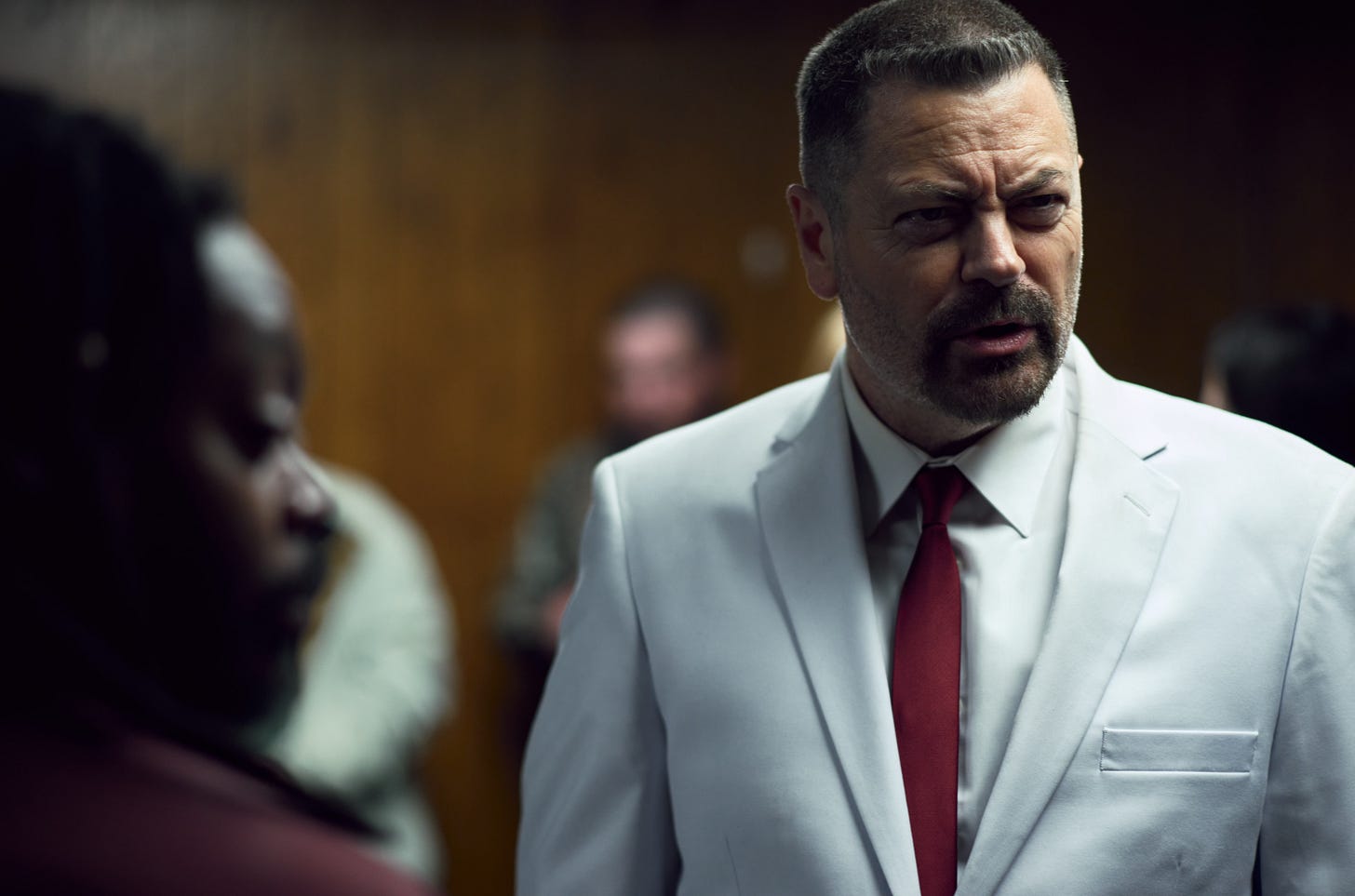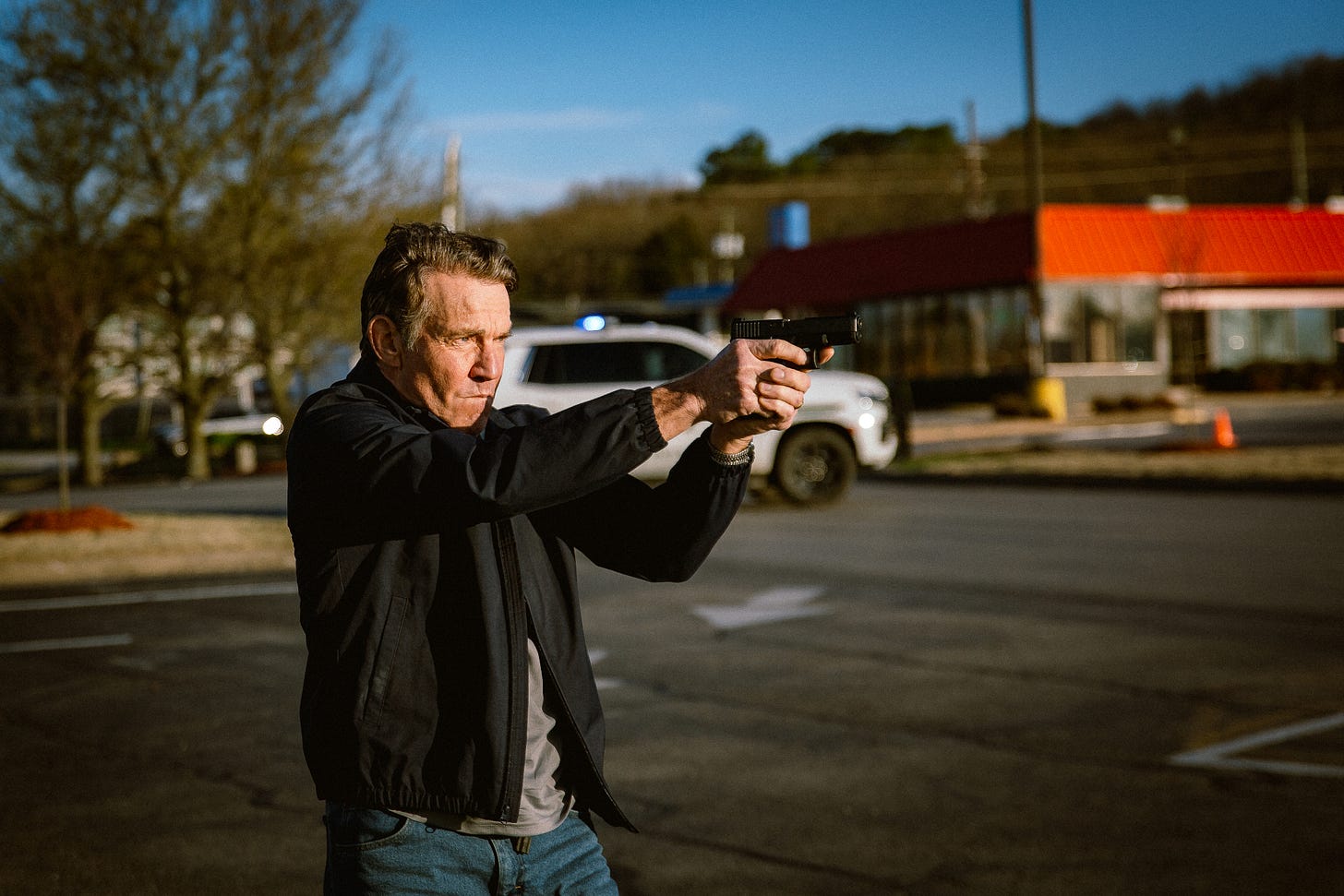Sovereign Review: Swanson Dinner
Nick Offerman brilliantly pushes his familiar character type into tragic reality
If you aren't familiar with the particular subset of libertarians known as Sovereign Citizens, just imagine the most annoying conservative proceduralist you've ever met online or in a college dorm, convinced they have a true mastery of the law that no fancy-pants attorney of the sheeple will ever command. The type whose youthful phase of idolizing Ayn Rand never ended. The sort of person so confident in their wrongheaded certainty of righteousness that he – it's nearly always he – stands prepared to argue a cop out of a traffic ticket by being actively hostile about it, even inviting the confrontation with a fake license plate and documents that are anything but an actual license and registration. All this on the grounds that “driving” is strictly defined by some archaic law as being for commerce only, and non-commercial transportation supposedly need not require a federal document.
Cops often watch videos of these guys for laughs; those who know the usual spiel might even try to mess with such people when they launch into their talking points. In 2010, however, it wasn't so funny when one of them opened fire. Sovereign, the movie, imagines the events leading up to that incident, in some cases using actual dialogue uttered by the subjects on various videos.
Nick Offerman is best known to most viewers as the libertarian, macho man Ron Swanson from Parks and Recreation, and has cultivated a public persona not unlike Ron's with his love of woodworking and whiskey, so it's not a stretch to imagine him as one of these guys. In his first dramatic lead role, building on the justified acclaim he got for his single episode of The Last of Us, Offerman is perfectly cast as Jerry Kane, a sovereign who makes a living giving paid lectures to the downtrodden, conservative poor who hope he'll reveal to them the magical solution to their most recent eviction or credit card bill. His house is in foreclosure, not because he can't make the payments but because he won't, insisting that because the bank has made ninefold interest on his down payment, they need to pay him that, and any other claim is theft. His high school-aged son Joe (Jacob Tremblay) is 16 and home-schooled, proud of his father but also desperate to make real friends his own age.
At first, writer-director Christian Swegal's script feels wholly on Jerry's side, minimizing his most outrageous claims and revealing him as both a loving, attentive father and a true believer that many Americans have been getting screwed by the government. He's not wrong about the hurt, but his solutions, the more we hear about them, start to sound more like contrived sophistry to get him specifically out of paying bills he genuinely owes. When he throws out references to illegal aliens, is he actually racist, or just pandering to a racist audience because he knows that's his demographic? It's unclear, and deliberately so, like the logic behind most of his tirades.
Presented in parallel contrast to Jerry is Dennis Quaid as a police chief named John Bouchart. Still looking like Ronald Reagan with his slicked-back, unnaturally dark hair over puffiness, wrinkles, and a spiffy suit, Quaid's look serves as shorthand that he's a different sort of conservative – the law-and-order variety who'd never condone rebellion against the government because he IS the firm, righteous hand of God-fearing government. He may be proud of his son Adam (Thomas Mann) for following in his footsteps as a cop, but won't say it, instead choosing to berate him for not being tough enough to let his newborn baby cry it out at night, rather than picking the kid up and losing hours of slumber. Both Jerry and John would probably support Trump, assuming Jerry were willing to register to vote, but for different reasons. Think Hank Hill and Dale Gribble, but for real, and with more guns.
The parallels between aging cop and middle-aged angry white man suggest a similar cinematic parallel, to Joel Schumacher's Falling Down, though unlike Schumacher, Swegal doesn't give them anything close to equal time – he gets that the seriously flawed protagonist is more compelling, and allots screen time accordingly. (It's possible and likely that Quaid was a lot more expensive.) Also unlike Falling Down is the fact that – minor spoiler, but seriously – neither of the characters is getting to win this one. Cops may find sovereign citizens funny on the whole, but Sovereign is Shakespearean tragedy, complete with a monologuing main character whose articulated outbursts can command sympathy even when utterly wrong and dangerous. In real life, most cops wouldn't resort to physical force on a sovereign citizen as quickly as they do here: many try to be patient, while others just try to fuck with them. It's a bit of dramatic license, and may be closer to how things were in 2010 before these guys became a known thing.
Jerry is stopped twice by cops during the course of the story, and both times things get heightened real fast, and go badly for him, making us wonder how exactly he manages to survive in a public speaking career that requires driving. It might have made for more suspense if the story showed at least one stop in which he successfully wears down the traffic cop with his unceasing verbiage and gets out of the ticket – the story gets simplified so that Jerry really only preaches to the converted, and has no such luck anywhere else. On the other hand, some of his life hacks do work out, like when he helps his girlfriend Lesley Anne (Martha Plimpton) overcome her longtime fear of horses.
As far as fatherhood goes, we see unintended consequences on both sides of the law from the two different strains of tough-love dad. The movie doesn't offer a third, non-conservative option, though the viewer might infer that such would be better than either example on display. To imagine that is to miss Swegal's point, though, which is empathy for all sides of a terrible incident that might have been avoidable if everyone else had more. There are hints that Jerry comes by his politics because of his tragedy in his past, and that Adam wants to be a more considerate dad than his own. Ideology, and a righteous sense of the way things ought to be – to coin a phrase from one of the most obnoxious right-wing influencers of my lifetime – poisons it all.
Jerry and Joe's home sets the tone – it's one-story, with a yard full of crap like an abandoned sofa and a rusty riding mower. When the power goes out, Jerry makes like Homer Simpson to Ned Flanders, secretly running an extension cord to his neighbors' outdoor outlet. My sole objection is I think the inside walls would be dirtier, and the dog messes more prominent – let's just say I've seen my share of real-life residences like this. Open skies, power cables and cutesy jokes on gun store marquees set the tone for the bleak beauty of the Kanes' lives, foreshadowing potential tragedy and possible lifelines. The conclusion is foregone, but the journey not without a quiet, cold charm.
If Sovereign were released at a different time of year, there might be awards talk for Offerman, just as there might have been for Michael Douglas in Falling Down with the right push and date. That's unlikely to happen as things stand, or with a poster that implies more of an action movie than the dramedy this is, but it should give Offerman yet another boost into meatier roles, and commence a run of awkward teen roles for Tremblay if he wants them. As for all those folks who complain Hollywood doesn't understand or empathize with red states? Watch this or STFU.
Just kidding. I know y'all will do neither.
Prefer not to subscribe via Substack? You can leave a tip through Buy Me a Coffee instead.
Sovereign opens in theaters today, July 11th. All images via Briarcliff Entertainment.








